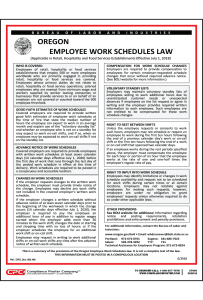 On July 1, some employers in Oregon will have more to focus on than the minimum wage as the first state-wide secure scheduling law goes into effect.
On July 1, some employers in Oregon will have more to focus on than the minimum wage as the first state-wide secure scheduling law goes into effect.
The new law establishes a wealth of scheduling-related rights for employees of large businesses who are employed in retail, hospitality, and food services establishments, including the right to know upcoming work schedules at least a week in advance.
SECURE VS. FLEXIBLE SCHEDULING
The growth of technology has allowed service industry employers to structure employee schedules around long-term and short-term predictions of customer demand based on factors such as weather, time of day, or recent foot traffic, with some applications touting their ability to allow managers to predict – and call in extra workers for – upcoming demand periods as brief as 15 minutes.
Although many employers consider this flexible scheduling capability to be a useful or even necessary aspect of doing business, the practice of short-term scheduling and on-call part-time employment has come under fire as employee schedules have grown increasingly unpredictable. In 2014, the national Bureau of Labor Statistics found that “66 percent of food service workers, 52 percent of retail workers, and 40 percent of janitors and housekeepers know their schedules only a week or less in advance” (Proposed Congressional Bill H.R.5159 – Schedules That Work Act (1)(6)).
Employee advocates argue that this model of employment is disadvantageous for employees and employers alike, although workers bear most of the brunt. When employees do not know when they will be required to work it can be difficult to schedule the rest of their lives, including medical appointments, education, and other work opportunities. Employees who are called in on short notice often report struggling to obtain child care, and employees who operate on an irregular schedule are more likely to forget a shift or run into unexpected transportation issues.
These stressors can cause an ripple effect back into the business, resulting in low employee morale, productivity, and retention. A retail experiment involving 28 locations found that stable scheduling practices such as setting schedules two weeks in advance and eliminating on-call shifts resulted in a 5% bump in employee productivity and a 7% rise in sales: “Our estimate is that Gap earned $2.9 million as a result of more-stable scheduling during the 35 weeks the experiment was in the field. Given that out-of-pocket expenses were small ($31,200), our data suggest that return on investment was very high.”
While some companies are moving away from irregular scheduling voluntarily, labor advocates have started pushing for government intervention. In 2017 Governor Kate Brown signed SB 828 into law, making Oregon the first state to mandate secure scheduling (also known as “predictive scheduling” or “safe scheduling”) for specified workers. Secure scheduling has been a growing movement in cities, such as New York City and Seattle, but Oregon’s step into the scheduling ring may presage other states’ participation in the trend.
OREGON SECURE SCHEDULING LAW
The Oregon secure scheduling law applies to employers in the retail, hospitality, and food service industries who have 500 or more employees worldwide. The requirements of the law cover employees working in the state of Oregon.
“Employee” does not include salaried workers, a worker supplied by a worker leasing company, or an employee of a business that provides services to or on behalf of the employer.
Stable Schedules and Advance Notice
Effective July 1, 2018, employers are required to provide each covered employee with advance notification of the employee’s work schedule. For new hires, the employer must provide a written “good faith estimate of work schedule” consisting of the median number of hours the employee can expect to work in an average month and specified information about the employer’s on-call expectations and, if applicable, use of a voluntary standby list.
 For existing employees, the employer is required to supply a written schedule for each work period. The schedule must:
For existing employees, the employer is required to supply a written schedule for each work period. The schedule must:
- be provided in writing
- be provided at least 7 calendar days before the first day of the schedule (starting in 2020, this notice time will increase to 14 calendar days)
- run from the last date of the schedule in effect at the time the new work schedule is delivered
- include all work shifts and on-call shifts for the period covered by the schedule
- be posted in the workplace, in English and in the language typically used to communicate with employees
New hires and existing employees both have the right to inform the employer of limitations or changes to their work schedule availability without retaliation. However, the employer is not obligated to grant an employee’s request not to be scheduled at certain times or at certain locations, except for reasons already protected under law.
Compensation for Schedule Changes
The employer may request a change to an employee’s schedule after advance notice has been given, but employees are entitled to decline. If the employee accepts the change, the employer may be required to provide compensation.
The employer must provide compensation equal to 1 hour at the employee’s regular rate of pay in addition to wages earned if the employer schedules the employee for an additional work-shift or on-call shift, or if the schedule change:
- adds more than 30 minutes of work to the employee’s work shift
- changes the start or end time of the employee’s work shift with no loss of hours
The employer must compensate the employee at 1/2 the employee’s regular rate of pay for each hour the employee does not work due to the employer:
- subtracting hours from the employee’s work shift for non-exempt reasons
- changing the date, start time, or end time of the employee’s work shift for non-exempt reasons
- cancelling the employee’s work shift for non-exempt reasons
- not asking the employee to work when the employee is scheduled for an on-call shift
See Oregon Revised Statutes, Section 653.455 (3) for the approved list of exemptions.
Schedule changes which occur at the request of the employee, including employee-initiated shift swaps or coverage, are not required to be compensated.
Mandated Rest Periods
Unless the employee requests or consents, employers are prohibited from scheduling or requiring an employee to work:
- during the first 10 hours following the end of the previous day’s shift
- during the first 10 hours following the end of a shift that spanned 2 calendar days
If the employee consents to work during these periods of rest, the employer must compensate the employee at 1.5 times the employee’s regular rate of pay for all portions of time worked within the mandated rest period.
Voluntary Standby List
Employers are allowed to maintain a voluntary standby list of employees who wish to be asked to work additional, unscheduled hours due to unanticipated customer needs or unexpected employee absences. Employees on the voluntary standby list are not eligible for additional compensation when they agree to work additional unscheduled hours, although they are still entitled to time-and-a-half when working during the mandated rest period.
Employees are entitled to decline additional hours, and to be removed from the voluntary standby list at their request, without retaliation from the employer.
POSTING REQUIREMENTS
 Employers are required to display a poster in the workplace which describes the employee rights granted under this Act. The Oregon Employee Work Schedules Poster is now available from CPC for $5.95 in a black and white 8.5″ x 11″ format. The Oregon Employee Work Schedules Poster describes employee and employer rights and responsibilities under the new law and provides contact information for the Bureau of Labor and Industries.
Employers are required to display a poster in the workplace which describes the employee rights granted under this Act. The Oregon Employee Work Schedules Poster is now available from CPC for $5.95 in a black and white 8.5″ x 11″ format. The Oregon Employee Work Schedules Poster describes employee and employer rights and responsibilities under the new law and provides contact information for the Bureau of Labor and Industries.
The poster must be posted in a conspicuous location in the workplace (Oregon Revised Statues, 653.460). Failure to post may result in a statutory penalty of $500 assessed by the Commissioner of the Bureau of Labor and Industries. Employers should ensure that this mandatory posting is conspicuously displayed in all Oregon establishments covered by the new law.
KEEP IN TOUCH WITH CPC!
To keep up with the latest in labor law news and posting compliance, follow us on Facebook, LinkedIn, or Twitter or subscribe to this blog! You can also contact us by phone, email, or chat to order one of CPC’s signature labor law compliance products or learn more about your company’s individualized posting obligations.
Please keep in mind that we are unable to provide legal advice.


Permalink
Hi, I have a question. My employer changed my schedule without giving me any notice so when the time came for my shift that I was in aware of they called me and asked me where I was. They already knew I had prearranged events planned because I was unaware of the schedule change. I was wondering if any “rules” were broken. I am 17 and work at a food franchise with over 500 employees world wide.
Permalink
Hi Ellie,
We are unable to answer questions about fact-specific work situations or provide anything that could be interpreted as legal advice. The Oregon Bureau of Labor and Industry (BOLI) is the appropriate resource for inquiries about specific employment law related matters. You can send a confidential email to BOLI here. BOLI also provides a fact sheet on predictive employee scheduling if you’d like to review aspects of the law before contacting them.
Thanks,
Katy